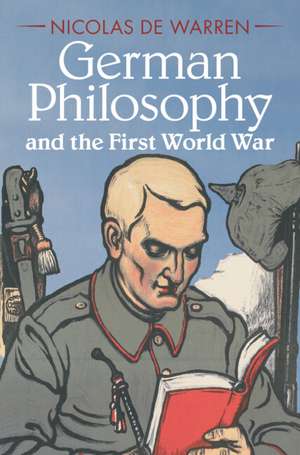German Philosophy and the First World War
Autor Nicolas De Warrenen Limba Engleză Hardback – 19 apr 2023
Preț: 234.53 lei
Nou
Puncte Express: 352
Preț estimativ în valută:
44.88€ • 47.99$ • 37.42£
44.88€ • 47.99$ • 37.42£
Carte disponibilă
Livrare economică 28 martie-11 aprilie
Livrare express 13-19 martie pentru 40.73 lei
Preluare comenzi: 021 569.72.76
Specificații
ISBN-13: 9781108423496
ISBN-10: 1108423493
Pagini: 382
Dimensiuni: 158 x 236 x 28 mm
Greutate: 0.8 kg
Editura: Cambridge University Press
Colecția Cambridge University Press
Locul publicării:Cambridge, United Kingdom
ISBN-10: 1108423493
Pagini: 382
Dimensiuni: 158 x 236 x 28 mm
Greutate: 0.8 kg
Editura: Cambridge University Press
Colecția Cambridge University Press
Locul publicării:Cambridge, United Kingdom
Cuprins
1. The genius of war, the genius of peace: Max Scheler's demons; 2. Deutschtum und Judentum: Hermann Cohen in the time of the nations; 3. I and you: Martin Buber and dialogical creation; 4. More than life: Georg Simmel's philosophical testament; 5. The apocalypse of hope: Ernst Bloch's phenomenology of utopic spirit; 6. The road to Damascus: György Lukács and History and Class Consciousness; 7. From death into life: Franz Rosenzweig's redemptions; 8. World-philosophy: Ernst Cassirer, freedom in ways of worldmaking; 9. Martin Heidegger and the titanic struggle over being; 10. The tragedy of the person: Edmund Husserl at war.
Recenzii
'These profound reflections on philosophy and the First World War reveal important dimensions of the genealogy of what still drives contemporary philosophy-the continuing resilience of religion in an increasingly secular world, the modern experience of alienation which seems to know no limits, the problems of violence, the question of history, the meaning of the political. This is, in short, a remarkable book.' James Dodd, The New School for Social Research, New York
'World War I, de Warren shows, was a philosophical earthquake. Not only did it transform the philosophers who lived through it, but the war itself acquired a philosophical voice – or, better, voices – that would, for good or ill, echo across twentieth-century thought. Rich in both philosophical and historical insight, German Philosophy and the First World War will remain a touchstone for years to come.' Michael Gubser, James Madison University
'World War I, de Warren shows, was a philosophical earthquake. Not only did it transform the philosophers who lived through it, but the war itself acquired a philosophical voice – or, better, voices – that would, for good or ill, echo across twentieth-century thought. Rich in both philosophical and historical insight, German Philosophy and the First World War will remain a touchstone for years to come.' Michael Gubser, James Madison University
Notă biografică
Descriere
A powerful exploration of how the First World War - 'the war to end all wars' - transformed German philosophy.
